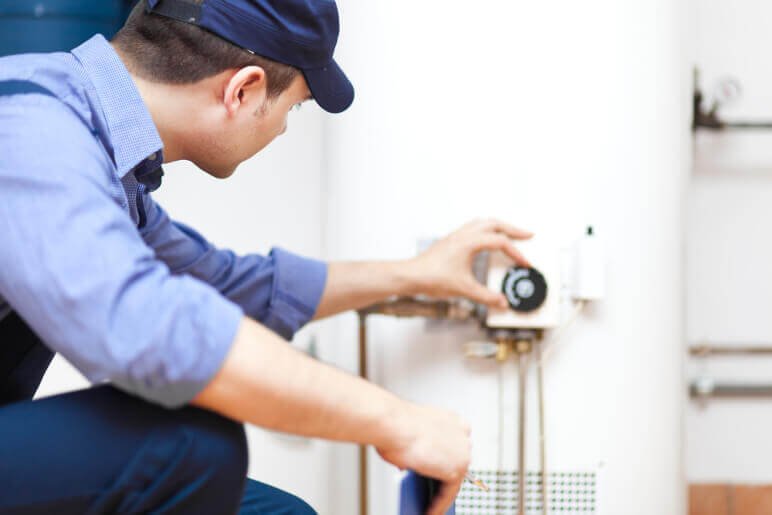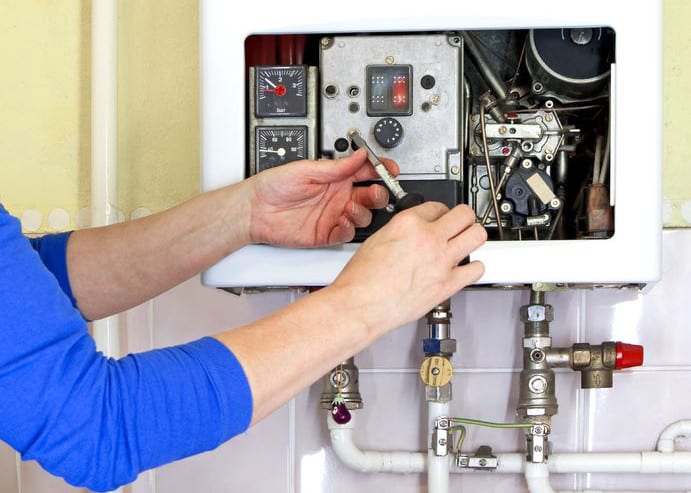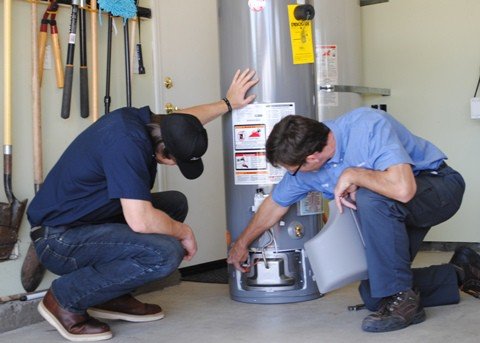What you need to know about the gas water heater
What you need to know about the gas water heater
Summery
- How does a gas water heater work?
- Types of gas water heaters
- Evacuation of gases
- Maintenance of a gas water heater
Quite widespread, the gas water heater meets the needs for domestic hot water production (DHW) by the combustion of gas. Although more expensive to buy, this type of water heater is economical in the long term. Operating principle, explanation of the instantaneous water heater, and the storage water heater, types of gas evacuation and maintenance, we explain everything there is to know to choose your gas water heater.
How does a gas water heater work?
The operating principle of gas water heaters is relatively simple: the combustion of gas heats the domestic hot water from the DHW tank to meet the needs of the home. Generally powered by city gas, or natural gas, from the municipality’s distribution network, a gas water heater can use either propane or butane in tanks. It is not a rare gas, however, it is much more expensive than city gas, which is why it is mainly reserved for homes not connected to natural gas.
The heating system is different from that of the electric water heater which will heat the domestic water thanks to an immersed electric resistance working with an electric current, often a soapstone resistance whether it is an ACI tank or a soapstone water heater. The gas water heater has a gas inlet and an air inlet, the fuel is burned thanks to the burner to give off heat which will instantly heat a water circuit or the cold water already contained in the hot water tank, depending on the type of appliance.

Also, being relatively energy-consuming, an electric storage water heater works by respecting the peak / off-peak cycles to heat when electricity is the cheapest, that is to say at night. The gas water heater heats on demand if it is instantaneous or heats day and night depending on the temperature of the water in the DHW tank.
A gas water heater can be a stand-alone unit or be connected to a gas boiler to supply hot water from time to time in the heating circuit of a home.
Types of gas water heaters
There are two types of gas water heaters depending on the domestic hot water production system:
The instantaneous gas water heater
This type of water heater does not have storage, so it will produce hot water on demand and with no time limit. An inlet supplies the cold water which will pass through a serpentine pipe through the heating body and the hot water will come out for its distribution. Its flow can reach 30L / min for some models. Also, be aware that there is a model called “bath heater” which has a higher flow rate providing more hot water per minute. The instantaneous water heater is practical due to its compact size, so it can be installed in a small space without being visible.
Are you looking for the best water heater replacement service in Fort Collins? Contact with Fort collins water heater pros.
The gas storage water heater
Unlike the first type of water heater, this one has hot water storage, the tank. The storage water heater provides better comfort through a constant hot water temperature. The heating time is quite short, allow about an hour to heat the water in a 185-liter tank to 65 ° C.
A mini sanitary hot water tank, or buffer tank, can be integrated into a gas boiler, in this case, it will be a micro-accumulation production since the storage will only be 2 to 3 liters. This mode of production is a compromise between snapshots and accumulation.
However, the DHW tank is most often independent, in this case, its water storage capacity can reach 300L depending on the model chosen and your hot water needs.
Note that if you want to connect your gas boiler or your condensing boiler to domestic hot water production, it may be worth choosing a thermodynamic water heater. This type of balloon works on the same principle as an aerothermal heat pump (air-water PAC) by drawing air calories to heat and maintain the water at the right temperature, previously set to the thermostat. This thermodynamic balloon is economical and allows you to further reduce your energy bill.
Evacuation of gases
Combustion will produce very dangerous residual gases, in particular carbon dioxide (CO²), and which must be evacuated outside the home so as not to harm your health. Thus, the evacuation of gases is done by two systems: either by a chimney flue or by a vacuum system.
The evacuation by a chimney flue is traditional but requires, on the other hand, the installation of ventilation grilles in the walls to renew the air in the room. The evacuation of gases by a suction outlet consists of laying a conduit passing through the external wall or the roof. The outlet of the flue will not protrude through the roof, unlike the chimney flue. The gases are evacuated and the air is supplied by a double-flow, or concentric, duct. This water heater will, therefore, be waterproof, respecting the same process as for evacuating the smoke from a sealed pellet or wood stove. This evacuation system has several advantages: it does not require sweeping and provides a 4% to 5% higher thermal efficiency by reducing heat losses.
Maintenance of a gas water heater
A gas water heater is made up of an enameled steel tank whose lifespan is threatened by limestone and corrosion. Tartar will have a direct impact on energy consumption. Corrosion, on the other hand, can cause a water leak if it manages to pierce the wall of the tank.
To protect your water heater against limescale, the best solution remains the installation of a water softener which will greatly reduce the scaling of the balloon but also of your other sanitary facilities. In all cases, you will need to regularly descale your water heater to optimize its service life. As with an electric hot water tank, corrosion can be avoided by installing an anode. The purpose of this small anti-corrosion part is to damage it first to avoid the formation of holes in the enameled layer of the tank. A magnesium anode will be diluted to add layers protecting the enamel and filling any holes. The titanium anode, or impressed current anode (ACI), will direct the minerals in the water towards the walls to protect them thanks to the emission of electric waves. However, the use of this anode assumes that your water is rich in minerals. The titanium anode is almost indestructible, unlike the magnesium anode which will not exceed three years of life. There are also hybrid anodes, in this case, the titanium will be covered by magnesium.
The security group involved in the proper functioning of your water heater is also to be maintained. This part ensures the correct pressure inside the tank of the water heater. As the water expands when it heats, the safety group regulates the pressure by adding water when necessary. This part is to be purged once a month and will have to be changed approximately every five years.
Finally, annual maintenance by a heating engineer will be necessary to guarantee the quality of your installation. A maintenance contract can be drawn up by your service provider for the proper monitoring of your gas water heater.

Choosing a gas water heater saves on your energy bill compared to electrical appliances. Producing domestic hot water using gas implies lower energy consumption. Opting for a hot water production mode adapted to your water consumption offers you comfort and avoids overconsumption.



